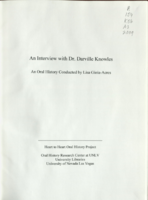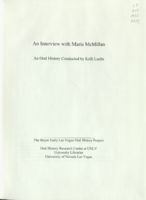Search the Special Collections and Archives Portal
Search Results

Transcript of interview with Dr. Darville Knowles by Lisa Gioia-Acres, October 9, 2008 and November 9, 2008
Date
Archival Collection
Description
Dr. Darville Knowles was born in Miami, Florida, in 1948. His mother and father were schoolteachers in Dade County. After their divorce in 1962, Darville's mother relocated to Las Vegas with her two sons and took a teaching position here. Dr. Knowles comments on the differences between Miami and Las Vegas as far as segregation regarding housing, education, and job opportunities. He also mentions that his grandmother had emigrated from the Bahamas and that she impressed on them to make their own situation and community better. He recalls that track and field athletics were desegregated before the contact sports, such as football and basketball. Darville and his brother Michael (a lawyer in Miami) both graduated from college. Darville attended Howard University and Stanford University Medical School and completed his internship at the Jewish Hospital of St. Louis. Dan Wilkes, a family friend and pathologist in Las Vegas, convinced Darville to look at Las Vegas for job opportunities. After trying St. Louis, Atlanta, Houston, and Los Angeles, Dr. Knowles finally settled in Las Vegas in 1982 and "grew' his practice at Sunrise Hospital. Dr. Knowles comments on health problems in Las Vegas related to eating choices, lack of exercise, and poor air quality. He describes how HMOs have changed the practice of medicine and gives his opinions on how health care should be addressed by Congress. He also discusses the future of medicine, the research he was involved in, and the AIDS crisis. Dr. Knowles talks about how medicine has changed since 1982, the large number of respiratory problems that he treats, and comments further on HMOs and the fixture of medicine in Las Vegas. He also shares that he found time to author a murder mystery and has plans to write more.
Text

Transcript of interview with Marie McMillan by Kelli Luchs, September 15, September 23, October 1, & November 24, 2009
Date
Archival Collection
Description
From an early age, Marie McMillan displayed an adventurous sensibility, a characteristic that is revealed in how life unfolded for her. In this multi-part interview, Marie begins with her birth in 1926 California, and continues with stories of her childhood recollections of the Depression era, her longstanding closeness with Nanny, her maternal grandmother, and memories of Old Bent, her paternal grandfather. She enjoys a flirtatious vitality and attends college for a year. However, as World War II begins to infest the U.S., Marie finds herself falling for a young merchant marine named Duke Daly. They marry, have two children, and live a transient life moving about California and Hawaii as he goes to school, then seeks and finds employment in a postwar economy. By the late 1950s, the Daly household is stressed and begin to split time between California and Las Vegas. Marie holds positions that require security clearance and administrative talents. In 1961, Duke passes away a
Text

Richard W. Bunker Interview, July 18, 2017, July 21, 2017, and September 28. 2017: transcript
Date
Archival Collection
Description
Fourth-generation Nevadan, Las Vegas native, and great grandson of Mormon pioneer Edward Bunker, Richard W. Bunker knows Southern Nevada as few others do. For example, when Richard Bunker speaks of water, he talks about his father's family leaving their home after the completion of Hoover Dam because their little town of St. Thomas was submerged in the rising waters of Lake Mead; he recalls swimming at the Old Ranch pool, the Springs, and the Mermaid pool; he shares stories of hiring Pat Mulroy, mentoring her, and encouraging her to apply to lead the Las Vegas Valley Water District; he mentions the Dunes and its two fresh-water wells, the Sanitation District and wastewater treatment. Few others have actively shaped Southern Nevada as Richard Bunker has through his lengthy career as a lobbyist (1973–2000); assistant manager for City of Las Vegas (1973–77); Clark County Manager (1977–79); member and Chair of the Nevada Gaming Control Board (1980–1982); executive director (1988-1990) and
Text

Transcript of interview with Ashley Hall by Claytee White, September 2, 2015
Date
Archival Collection
Description
Ashley Hall was born April 3, 1943 in Caliente, Nevada. After high school, he worked for the Union Pacific Railroad at the Nevada Test Site as a cashier and as a signalman. He later attended Brigham Young University and the University of Nevada, Reno. After college, Hall served the City of Las Vegas in significant ways. Notably, as City Manager he was instrumental in the initial development of Summerlin, Nevada. Though he has retired from local politics, he remains active as the President of the Old Spanish Trail Association and as the U.S. Army Reserve Ambassador.
Text

Transcript of interview with Kevin T. Orrock by Claytee D. White, December 04, 2015
Date
Archival Collection
Description
Kevin T. Orrock, president of Summerlin and vice president of Master Planned Communities for The Howard Hughes Corp., has come full circle. Born in Pioche, Nevada, he spent his early years in the San Francisco Bay area and in Pittsburgh, Pennsylvania. Graduating from a small liberal arts college, he arrived in Las Vegas in 1974 with a degree in accounting and a teaching credential, finding work in the Desert Inn accounting department. Howard Hughes owned the Desert Inn, so from 1974 Orrock has consistently been in the employ of Howard Hughes, Summa Corporation, and Howard Hughes Corporation. Orrock later earned his M.B.A. at UNLV. In this interview, Orrock focuses on Summerlin, the 22,000-acre, award-winning, master-planned community on the west side of the Las Vegas Valley. He discusses Summerlin’s physical layout, its history, its development, and its future. He specifically credits Summa Corporation’s early visionaries John Goolsby and Will Lummis for having the foresight to sell some of the company’s land in order to build the financial foundation that, in turn, permitted Summerlin’s fifty-year development plan. He also talks about the development and future of Downtown Summerlin; its balance of private, charter, and public schools; and the ways the company selects its residential builders.
Text

Transcript of interview with Steven and Wendy Hart by Barbara Tabach, October 23, 2014
Date
Archival Collection
Description
Steven Hart was born on April 7, 1946, and moved to Las Vegas as a one-year-old with his parents Nat and Sylvia Hart. After graduating from Las Vegas High School, Steven Hart went through an apprenticeship program to become a journeyman carpenter as his father wanted him to learn all phases of the hotel, restaurant, gaming, and business. Including hot to build and design them. He then enlisted in the United States Navy and joined its construction battalion during the Vietnam War. Upon his return to Las Vegas, Steven followed in his father?s footsteps working in the casino industry. Nat Hart was one of the city?s original celebrity chefs and corporate vice president of food and beverage for Caesars World. Well-known for his restaurants at Caesars Palace and the Desert Inn, and for his popular gourmet cooking school. During his long career as a successful gaming executive, Steven worked at several properties, including the International Hotel as food and beverage controller. He was the vice president of food and beverage for the Del Web Corporation. The assistant corporate food and beverage director at the Argent Corporation as well as the Casino Credit executive and Junket Representative for Caesars World. He worked as executive casino host at Bills Gamblin Hall and Hotel in addition to working as the hotel gaming consultant with Hart Gaming LLC. Steve?s wife and dad also owned Kazuku Yakitori, Ichi Ban Japanese steak house, Ringside Bar and Grill and the World Boxing Hall of Champions Museum. In 1985, Steven married Texas-born Wendy Stark Hart, who is also present during this oral history interview. Wendy Hart also pursued a career as an executive in the food and beverage industry. Together, Steven and Wendy Hat reflect at length about Nat Hart?s successful career, particularly as longtime corporate vice president of food and beverage for Caesars World Inc., and opening many of the company's restaurants at Caesars Palace locally and in Atlantic City. Steve and his dad also put in many restaurants for many of the Las Vegas Strip hotels. They discuss both Nat?s relationships with infamous industry figures, like Frank Rosenthal and Hy Goldbaum, and Nat?s dining endeavors with other industry leaders such as like Kirk Kerkorian and Stu and Cliff Pearman. They also highlight the innovation and creativity that Nat brought to his work. Steven also talks about his own career path, from working small jobs at the hotels while in high school, to his military service and developing construction skills, to learning various aspects of the gaming industry management. He reminisces about his childhood in Las Vegas and involvement with Jewish community, including being the first bar mitzvah at Temple Beth Sholom and later serving as president of Jewish War Veterans, Post 711.
Text

Transcript of interview with Andy Katz by Barbara Tabach, February 16, 2016
Date
Archival Collection
Description
In this interview, Andy Katz discusses his family, his childhood growing up in Las Vegas, and attending UNLV. His parents, Mike and Bea Katz, established Manpower, an employment agency, which Andy served as president.
Andy Katz is the youngest of four children born to Michael and Beatrice Katz. When Andy was a little over one-year-old his family moved from New York City to Las Vegas. During this oral history Andy highlights his family?s background and the entrepreneurial spirit of his father that inspired the move in 1963. By 1964, Mike Katz, Andy?s father, was well-known in Las Vegas for providing an answering service and subsequently for opening the Manpower franchise to serve the growing town. In time, this family business grew and the eldest sons, Bob and Mel opened franchises in Salt Lake City and San Diego, respectively. Andy recalls his steps to joining Manpower in this interview. With great humor and fondness, he describes the friendships he formed in public school, Hebrew school and Jewish youth organizations. Andy easily slipped into active leadership roles; it was a role he would continue during his years at UNLV, where he earned a Business degree and was active with the Alpha Epsilon Pi fraternity. Born Andrew Scott Katz on January 9, 1962, Andy, as everyone knew him, passed away suddenly on February 23, 2016. It was exactly one week after this oral history interview. The scheduled next session was not to occur.
Text

Transcript of interview with Dayvid Figler by Barbara Tabach, June 22, 2016
Date
Archival Collection
Description
Dayvid Figler (1967 - ) is the quiet boy who became an insightful and creative contributor to the local culture of Las Vegas. The oldest of Barbara and Meyer Figler?s three children, he was four years old when the family station wagon reached Las Vegas in 1971. They moved in with Uncle Izzy (aka Big Irish) Figler for a few months. Having the ?juice,? Dayvid?s father soon became a Pan dealer on the Strip. As the family grew, Barbara eventually immersed her energies in her children?s activities, Hadassah and Temple Beth Sholom. In this oral history, Dayvid also recalls his awkward, but incredibly interesting youth, his bar mitzvah at Temple Beth Sholom, and path to a successful career as a criminal defense attorney. He also talks about embracing Las Vegas as his home, owning a home in John S. Park neighborhood and mentions a number of literary depictions of Las Vegas that he admires. Dayvid describes growing up a ?casino kid? who lived in an apartment near the Riviera Hotel. This, in addition to his slight stature and academic brilliance, may have set him apart from many of his childhood peers. He graduated from Valley High School at the age of 16 and by the age of 23 he was a rising star in the legal world. He looks back with appreciation to his list of mentors who encouraged him along the way. Dayvid is also a local favorite as an essayist and poet. For a number of years he could be heard on KNPR/NPR. He has been a performer in hundreds of productions that featured his comic wit and writings, from Lollapalooza to Tom and Jerry?s on Maryland Parkway.
Text

Transcript of interview with Arne Rosencrantz by Claytee White, February 9, 2010
Date
Archival Collection
Description
In this interview, focused on the John S. Park neighborhood of Las Vegas, Arne Rosencrantz discusses his childhood growing up in Las Vegas. He talks about local businesses, including his father's furniture store, as well as schools and churches in the neighborhood.
Arne Rosencrantz remembers living on Beverly Way from 1954 to 1970. Like so many others from that era, he attended Fifth Street School, John S. Park Elementary School, John C. Fremont Middle School and graduated from Las Vegas High School. As a Jew, he was in a small minority, but fondly recalls growing up in the dense Mormon population of John S. Park Neighborhood. As a youngster, life in Las Vegas was filled with fun. The desert provided opportunity to hunt lizards and rabbits. Kids walked to school without concern. They played ball and found the Strip casinos welcoming to locals. He tells how the social issue of segregation of the 1960s did not affect him personally, but how local movie theatre owner Lloyd Katz fought to make his Huntridge and Fremont theatres integrated. He also reminisces about his father opening Hollywood Furniture and later Garrett's Furniture, which Arne operated until retiring in 2001. During the interview, he lists other furniture companies and the strong assortment of other retailers and restaurants that served the neighborhood.
Text

Transcript of interview with Burton Cohen by Claytee White, January 9, 2009
Date
Archival Collection
Description
In this interview, Burton Cohen discusses his involvement in the Las Vegas casino industry, including booking entertainment for various hotels.
Burton Cohen's long casino executive career began in the mid-1960s when he accepted a proposition to become involved with the transformation of the Frontier Hotel. He left his south Florida roots and law practice to become a co-owner/general manager of the Frontier Hotel. Thus, began his highly regarded Las Vegas presence. For nearly four decades he served in the management of some of the Strip's most famous casinos: Flamingo, Dunes, Circus Circus, Caesar Palace, Thunderbird and the Desert Inn, which remains his favorite. In this interview, Burt reflects on the positions he held, the celebrities he hired and befriended, and offers a unique look at the behind the scenes marketing and entertainment strategies that he helmed. He shares stories of becoming entrenched in casino operations, his reflections of union experiences, and even anecdotes about moving his mother to Las Vegas.
Text
